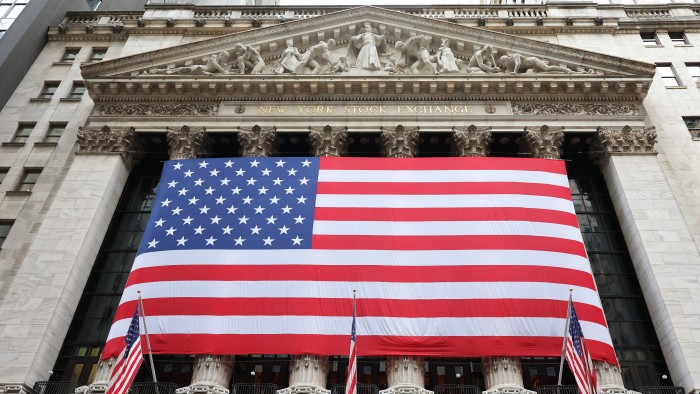Stay informed with free updates
Simply sign up to the US equities myFT Digest — delivered directly to your inbox.
US stocks dropped on Tuesday as jitters over highly elevated valuations for many artificial intelligence companies intensified and top Wall Street executives said markets were vulnerable to a pullback.
The blue-chip S&P 500 closed 1.2 per cent lower, while the tech-heavy Nasdaq Composite fell 2 per cent. The healthcare and consumer staples sectors, often viewed as a shelter in shaky markets, posted modest gains.
Major cryptocurrencies were swept up in the sell-off, with bitcoin briefly falling below $100,000 a token for the first time since June. Gold slipped 1.6 per cent to $3,935 a troy ounce.

US stocks have climbed to record highs in recent months, with AI companies accounting for most of the market’s gains. Yet worries about high valuations, and how long it will take for the huge investments by Big Tech in data centres to generate returns, are becoming more pronounced.
Emmanuel Cau, head of European equities strategy at Barclays, said: “There is clearly some fatigue after a very strong run and lot of catalysts having played out already, on top of concerns about an AI bubble and [the] US government shutdown.”
Max Kettner, head of multi-asset strategy at HSBC, added that investors had also been “spooked” after senior US bank executives said valuations had become stretched in some stocks and markets remained vulnerable to a significant wobble.
The Nasdaq is priced at about 30 times forward earnings, well above the average over the past decade of 25, according to FactSet data. Many tech high-fliers are priced at higher multiples, with Tesla trading at a PE ratio of more than 200 and cyber security group CrowdStrike above 100.
Goldman Sachs chief executive David Solomon said at a conference in Hong Kong on Tuesday: “When you have these cycles, things can run for a period of time. But there are things that will change sentiment and will create drawdowns, or change the perspective on the growth trajectory, and none of us are smart enough to see them until they actually occur.”
Morgan Stanley CEO Ted Pick at the same conference noted that while markets remained sanguine, “we should also welcome the possibility that there would be drawdowns, 10 per cent to 15 per cent drawdowns that are not driven by some sort of macro cliff effect”.

Tuesday’s declines came after several large tech stocks had been propelled higher this year by investors’ hopes around AI beating analysts’ expectations but were nevertheless punished by investors.
Peter Thiel’s defence group Palantir, which boasts the highest valuation relative to its profits of any S&P 500 company, was at one point the market’s worst performer, down as much as 10 per cent before paring some losses.
Palantir late on Monday lifted its 2025 revenue guidance as its executives cheered “the number of opportunities” presented by America’s involvement in conflicts around the world.
However, the disclosure of a $912mn bet against Palantir’s shares by famed hedge fund manager Michael Burry appeared to unnerve some of the investors who have driven the stock higher this year.
Ridesharing group Uber slipped 5 per cent on Tuesday even after it said late on Monday that its sales rose by a fifth year-on-year to $13.5bn.
The sell-off was not confined to tech stocks. Norwegian Cruise Line fell 15.3 per cent after it reported lower than expected revenues, while energy group Marathon Petroleum slipped 6 per cent after missing analysts’ forecasts of earnings per share.

